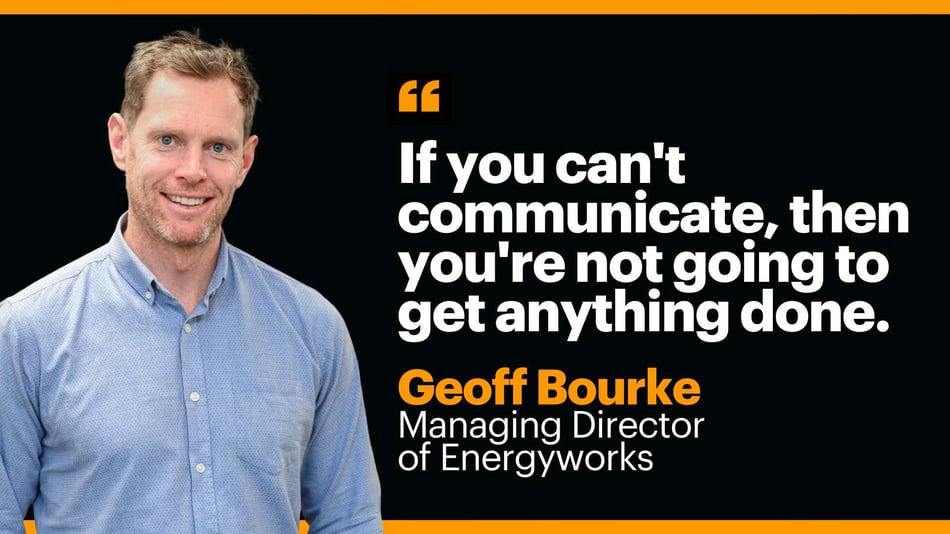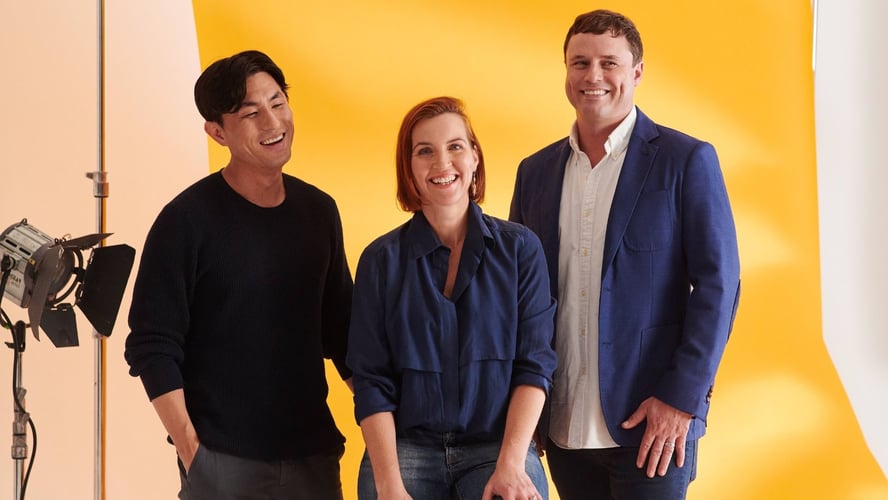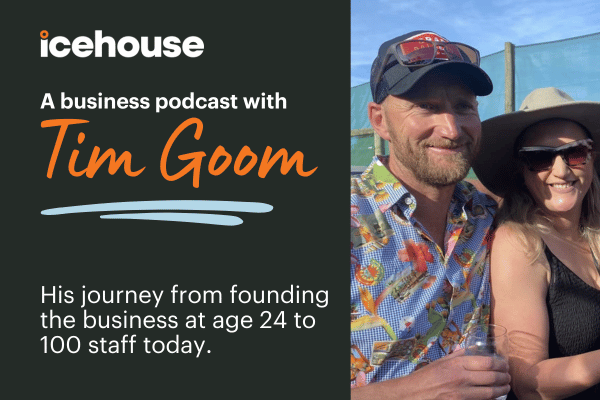Singing From the Same Hymn Sheet - Geoff Bourke's Journey Into Ownership & Leadership

A few years on from completing the Owner Manager Programme, Managing Director of Energyworks Geoff Bourke is proud of the goals he set out to achieve, and he’s got a team around him singing from the same hymn sheet.
Tell us a bit about yourself. What are you passionate about?
I'm a Taranaki local. I grew up on a farm here, went to boarding school in New Plymouth and then went away from the region for 10 or 12 years. I got an engineering degree from Canterbury and studied at the University of British Columbia in Vancouver as well and then I worked in the UK for a few years.
I’ve always been keen on travel and was really fortunate that mum and dad instilled that into us kids. From a young age, we were fortunate to do a fair bit of travel. In 2011, my wife to be and I came back from the UK and we have been in New Plymouth ever since and now with four young kids.
What is your sense of personal purpose in life?
I really don't like letting people down and that's also been instilled in me from my parents. So, if I make a commitment to do something, I really want to follow through to deliver on that.
And I think that's a key message within the Energyworks business, if we make a commitment, we follow through. And that slowly builds credibility by repeating that over and over again.
Personally, I really like seeing capacity growth in individuals. So having been on this Icehouse course myself and getting the positive outcomes I wanted to put a lot of our team through the Leadership Development Programme, or the Emerging Leaders Programme. So you start to sing off the same hymn sheet, when the key part of your management team, have all had some of that same training.
I've got three pillars to allow me to be the best I can be at work and the best I can be at home, which is pretty simple stuff - sleep, nutrition and exercise. If I get those three things about right, then I know I can personally be in the best headspace to help and lead others.
I ultimately try and wrap that up as one little saying - try and create more value than you take.
And I think that stands very true, whether it's just at home or in your community or at work. If you're taking more value than you create, then you're starting to erode value, and that's going to come and unravel itself pretty quickly. Whereas if you create more value than you take, then you're creating a sustainable model that's got some longevity about it.
Tell us about the Energyworks business itself and how you got involved.
I worked for one of the big corporate, oil and gas companies for six years and had dealt with Energyworks a lot as a supplier, so I knew the company fairly well. It sold in 2014, to a private equity firm, but I was using the previous owner as a bit of a mentor at that stage. He knew that I was starting to get itchy feet and was keen to get out of the corporate world and pave my own path.
He bought the business back in 2017 and it's one of those stories of timing. It was perfect timing for me, because he didn't want to work in the business longer term - he was ready to step back not too far down the track. And I guess I became his succession plan. I managed to come in three months after he brought the business back. And then it was literally a handshake deal that if I did prove my worth, there'd be an opportunity to buy into the business and, and that materialized over the next couple of years. He's still there at a director level and a great reference and mentor still for me, but generally, the day to day running of the business strategy sits at my level, and with the senior leadership team. Ultimately, it's remained a locally owned business after it was brought back from the private equity firm and there’s something quite nice about that in a small community, that we are still locally owned and providing good employment for 150 to 160 people.
What's a piece of advice you'd give to your younger self knowing what you know now?
I think you hear a lot of people say that there's no silver bullet in life. And I think that's mostly right. But I feel like there's possibly one and that's education. And I look back now, and I feel like I've been afforded that through what my parents encouraged me to do.
Trust that education has a massive bearing on your life, take every opportunity. And that's not just your traditional primary, secondary, tertiary education, it's every day - be a sponge, learning from other people.
I think you’ve got to think about investing in yourself as no different to investing in a share market or in a business. But I think an investment in yourself in the long term will pay greater dividends than some of those other traditional transactional investments. So if I was talking to school leavers or early 20 year olds, I would reinforce the importance of education and how it creates networks as well. You cannot underestimate the value of a network. I went through engineering school and heaps of my classmates are now in similar positions of being business leaders around the country. And it's an amazing network for me to call on when I need to align resources in some part of the country or share problems.
What's something that you were proud of achieving last year?
It’s coming to about the five year mark being managing director and it's quite a good window of having plans and targets. There’s been the capex spending and the systems improvements in the business. And a lot of those systems improvements, were motivated off going on the Owner Manager Programme and so now getting towards the end of them has been quite satisfying. They're not overly glamorous projects; the in house IT systems, procedures, plant management, values, culture, important stuff, but not necessarily getting the headlines.
Ultimately trying to set the business up for the next 20 years and being contemporary with all the right systems and processes. We won a reasonably significant health and safety national award last year in the workplace health and safety awards, and we work in a very high hazard industry around a lot of high pressure, , highly explosive materials that we are exposed to every day. There's a lot of focus on process controls and hazard mitigation and to get some recognition of that was pretty cool.
At a personal level, I jumped into the Coast to Coast event last year, I managed to get from one side of South Island to the other in one piece. So to get that done was a personal target achieved.
What has been a challenge within the business? And how did you overcome that challenge?
Our big on-going challenge is the decarbonization journey. We're a business that's historically been fairly wedded to the oil and gas industry. That's obviously going to curtail and sunset at some stage in the next 10 or 20 or 30 years - who knows. So, we need to do more business development outside of the region, creating new networks and client relationships and, and having a delivery proposition that's cost competitive outside of Taranaki, but remaining in the heavy industry space. Over the last couple of years, we've made a concerted effort to get in front of other heavy industry players around the country and pitch the delivery model and it's slowly working but it’s hard work to get in front of some of those companies and get contracts in place.
There's HR issues that come with it when you've got a workforce that's been used to going home every night that potentially might have to spend a week on the road every other week and that's probably the biggest challenge that we're going through at the moment.
How did you connect with The Icehouse. How did that all come about?
When I came into the business, the owner had been on the Owner Manager Programme previously - he had a good experience on it and suggested that I go on it. I had a really good crew on the course and learned a lot. Whilst you're coming from different business backgrounds, forget the technical aspect of what you're building or selling, everyone's still facing the same challenges in terms of recruitment of staff and trying to build a better culture and how to communicate better and all that sort of stuff.
Did anything surprise you about the Icehouse programme?
I didn't expect there to be such similarity of conversation around some of those key things. But I was relatively young in my business ownership journey. So I think I went in fairly open minded without taking any preconceived ideas in there. A bit of advice to anyone else who's going or looking to go on the course - You definitely want to go in keeping an open mind and being free to share information. Some people were very free with the information and it was a pretty strong welcoming point when you got there on the first morning in our case, and some people telling their stories broke down in tears. You could see the passion and what it had meant to them to get their business to where it was today. Seeing that on day one, you quickly realized that you're amongst some pretty impressive people, and you should sit down and listen up, but be prepared to tell your story as well, because there's a lot of motivation in hearing those stories – being a business owner can be a lonely journey if you haven’t got shareholders in your office to bounce ideas off.
You often take a hell of a lot home with you every day and there’s a lot sitting on your shoulders, there’s a big responsibility for the employment of a lot of people at times. I think talking about it with people who understand is good therapy.
What has been the result of putting leaders on The Icehouse leadership programmes? Has that helped when it comes to making changes within the business?
Yes, I think it has.
If you're singing from the same hymn sheet then that messaging can get across a lot easier. You know, one of the big takeaways for me was communication.
It's a word that's thrown out around so free and easily. I came away from the course having a deeper understanding of the importance of communication whether that's internal or external, you can't do anything without communicating what you need to be done. So that's one of the changes, I guess. And the business we've made has just been very structured around how we communicate, and what are the outcomes you want from that piece of communication, whether it’s best to be done face to face, or through pictures or through a drawing there's different forms of communication. And that's really where everything starts.
If you can't communicate, then you're not going to get anything done.
Now that the majority of our management team has been through one of The Icehouse leadership programmes, then everyone's had a snippet of where I'm coming from, so they can understand the science behind it and everyone's a lot more willing to understand and follow the kind of direction that I'm wanting to lead the company in.



